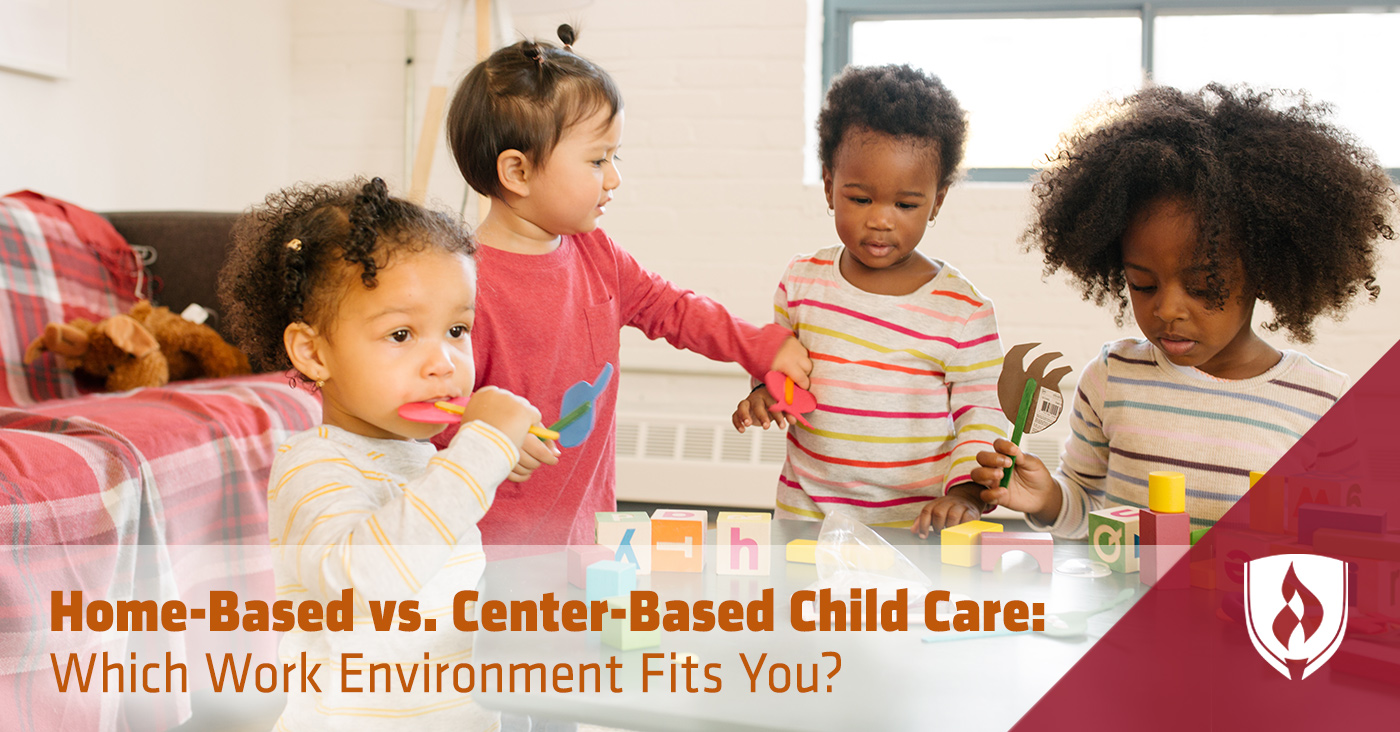Home-Based vs. Center-Based Child Care: Which Work Environment Fits You?
By Brianna Flavin on 06/22/2015

Have you ever checked your child into a daycare center or a home-based family care and thought it must be a promising industry? Well, you weren’t exactly wrong!
While childcare can be a rigorous profession, the demand is high and still growing. In fact, the U.S. Bureau of Labor Statistics (BLS) projects employment for childcare providers to grow by 14 percent through 2022.
There are a handful of reasons individuals choose to pursue a childcare career. You might have a passion for caring for young ones and nurturing them into adolescents. Or perhaps you want to leverage the marketable skills you’ve acquired as a parent. Or maybe you’re just looking to eliminate the expense of finding care for your own children.
Whatever your reason is for choosing this career path, there’s still one more decision you need to make: home-based child care versus center-based child care. We connected with some childcare experts to diagnose the differences so you can choose which direction is best for you.
Home-based vs. center-based child care
“First and foremost, anyone interested in this field must be passionate about early childhood education (ECE) and establishing a life-long love of learning in children,” says Celeste Wilhelm Flaherty, a recruiter for Celebree Learning Center. She believes this is the most important trait a childcare provider must have. Children make the job worth it. The other benefits depend on the environment in which you choose to work.
Both settings have advantages and disadvantages, so it’s important to have a good understanding of each before choosing a side. Both will allow you to exercise your passion ECE but one may be better suited to your schedule and personality than the other. Keep reading to learn the facts about home-based versus center-based child care.
What to expect from a center-based child care environment
Working at a center has some major advantages. One of the most enticing perks of joining an existing childcare company is the possibility of receiving a benefits package, according to Flaherty. Her company offers their providers health insurance, 401k fund participation, paid time off and even a tuition assistance program.
“Plus there is a greater work/life balance when you do not work where you live,” Flaherty adds. Some people need that physical and psychological separation between work and home in order to maintain peace of mind.
"There is a greater work/life balance when you do not work where you live."
Another advantage is the fact that you’ll be working alongside other teachers, offering mature conversation and support. Flaherty explains that ECE strategies and philosophies are always evolving, so teachers must be avid learners themselves. Collaborating and learning from other teachers can help you develop as a professional.
However, some may view this close proximity to other teachers as a drawback, as it could make you feel uncomfortable or self-conscious. This interaction with other adults is something you won’t likely experience in a home-based child care.
“You need to be a little goofy, really,” says Mary Muhs, dean of the Rasmussen College School of Education. “The teachers who do really well in these environments are the ones who aren’t afraid to get down and dance with the children.”
Another disadvantage of working in a center is that you must be willing to adapt your personal philosophy, according to Muhs. At a center, the philosophy of education and activity plan is typically already in place, so you may need to adapt to a new way of thinking. She advises those who have strong opinions about ECE strategies to learn about a center’s approach before signing up.
What to expect from a home-based child care environment
Muhs has seen several ECE professionals choose the route of opening a home-based child care, also known as family care businesses. She says it’s a great opportunity to make a business out of something you’re already doing anyway.
“I wanted to be with my children and get to do what I love professionally,” says Natalie Marose, owner of My Friends Christian Child Care and Preschool. For people like her, the biggest benefit is being about to spend time with your own children while caring for others’.
"I wanted to be with my children and get to do what I love professionally."
“You become a big role model,” Muhs says. Home-based child care providers are often more involved in the children’s lives because they’re not being moved from room to room, teacher to teacher. This consistency is extremely beneficial for the children as well, according to Marose.
Another appealing aspect of a home environment is the ability to call your own shots when it comes to hours, rates, curriculum, vacations, etc. Being your own boss has its benefits, but it also come with drawbacks. With no director, board or other teachers, “the buck stops with you,” Marose says. It’s important to be prepared to interact with parents, remain open to criticism and take responsibility for incidents that may occur.
Another disadvantage to working in home-based child care is the long hours. Marose recalls working as long as 12 hours a day when she ran her family care business. Opening up your home for this extensive workday has the potential to cut into your personal and family time.
Choose your path
You should now have a better idea of which childcare environment aligns best with your personal proficiencies and preferences. Whichever side you decide in the debate of home-based versus center-based child care, you’re still one step closer to starting the satisfying career you’ve been seeking!
Do you think home-based child care is the right path for you? Check out this guide for opening your own daycare.
Are you leaning more towards center-based child care? Here are some tips for landing a job at a daycare.
Curious which environment is better for you? Check out. Early Childhood Education vs. Elementary Education: Which Environment is Right for You?
Related Articles:
- Montessori Schools vs. Reggio Schools: The Differences in these ECE Disciplines
- Education Experts Share 10 Tips for Dealing with a Difficult Child




